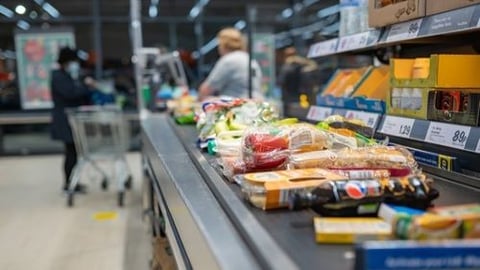Natural and Organic Brands: Finding (and Keeping) Their Place in Shoppers’ Baskets
Shoppers searching for a wide selection of natural and organic products can find what they’re looking for at their neighborhood Kroger. As the nation’s largest grocer, Kroger is also the leading natural and organic food and beverage retailer, with its exclusive Simple Truth brand securing the position as the largest natural and organics brand in the world.
In the past year, more than 73% of Kroger households purchased an item in this category, clearly demonstrating that this selection is important to them. Natural and organic brands continue to be a vibrant growth opportunity for the company.
84.51°, the retail data science, insights and retail media company that leverages Kroger’s transaction data, analyzes how natural and organic brands – large and small, established and emerging – are finding their place amid mainstream retail grocery outlets.
Defining ‘Natural’ and ‘Organic’
With a wide variety of products available, it can be difficult to clearly delineate what’s “natural” and what’s “organic.” Kroger defines these terms as:
- Natural: Food and beverage products that are free from more than 101 artificial preservatives and ingredients. For health and beauty, the “free-from” list rises to more than 400 ingredients.
- Organic: This is an industry standard defined by specific criteria, created and enforced by the USDA, and given a symbol to easily identify products that meet these standards.
Meeting Customers Where They Are
Understanding the omnichannel shopper and creating a seamless shopping experience is an important strategy for the company’s growth overall growth and in this category.
Millennials are some of the most likely to take an omnichannel approach to their grocery shopping and will likely maintain these behaviors throughout their lives. In the past year, 5 million omnichannel Kroger shoppers purchased natural and organic items online; two-thirds of which were brand-new to the category. Among these 5 million, 7% are highly loyal, spending more than $500 per household per year on natural and organic food alone, across an average of 30 trips.
Price Matters … And So Does Taste
Within the omnichannel segment buying natural and organic products, price remains important. Price-sensitive online shoppers are spending more time considering cost while shopping online, from comparing prices to looking for coupons. Knowing this, brands should offer shoppers a healthy edge and value for the dollar.
As snacks and beverage continue to be top-performing natural and organic categories, brands must optimize for both price and taste. Lower price can be a top motivator when a customer is making a purchase decision between a natural/organic or a conventional snack, along with the shopper’s trust in the brand and the product’s ingredients.
What Else Is Behind Natural and Organic Growth?
In addition to focusing on the omnichannel consumer, several key factors drive growth in Kroger’s natural and organic category performance:
- Natural and organic integrated storewide: Several years ago, Kroger started the transition from a separate natural and organic section within the store to integrating natural and organic products alongside their mainstream counterparts. The grocer found that when customers compare ingredients, price and even packaging, more households purchased natural/organic products and spent more in the category. Integration paves a solid growth path for natural and organic brands, since the customer can easily make comparisons and discover new products.
- In-store communications: Kroger continues to expand how it communicates its wide range of natural and organic offerings to customers. In-store signage remains an important way to share the message with shoppers. Customers may expect product highlights in produce, grocery, and health and beauty – the grocer also features important natural and organic callouts in its meat, frozen and refrigerated departments. For example, last year it added green “plant-based” clings to doors to help customers find the natural plant-based milk and yogurt options.
- Integrated campaigns. Each quarter, the Kroger Precision Marketing group at 84.51° creates a multichannel campaign focused on natural and organic that complements in-store communications. The team collaborates with CPG brands to highlight the natural and organic products that meet customers’ lifestyles and dietary needs – all at a great price. One of its most popular promotions is “Starting the Year Right” in January.
Building a Brand’s Retail Profile
From established to emerging brands, value remains important to customers, but how can brands achieve it? Here are a few tips and tricks:
- Communicate a clear ethos: Natural and organic customers react positively to seeing a brand with a cause that gives back to its local community.
- Innovate: Offer a broad array of natural and organic brands that represents the best advances in taste, price, sustainability and social responsibility.
- Maintain adequate stock: This is a critical consideration as brands continue to grow the category.
- Look good everywhere: Shoppers spend seconds deciding on the products they want, both in-store and online. Brands should focus on how their packaging looks across omnichannel shopping opportunities. Product benefits should be clear and quickly understandable by shoppers.
Natural and organic brands are enjoying an ever-widening spotlight among their mainstream counterparts, online and in-store. The more they assess market data on shoppers’ preferences and behavior, the better set up they’ll be to meet the shopper where they shop.
Holly Adrien is the natural and organic strategy and innovation manager for The Kroger Co., the nation’s largest traditional grocer. With a deep background in customer insights, analytics and merchandising, Adrien leads development of Cincinnati-based Kroger’s strategic focus for natural and organic, and is responsible for execution of top activations to meet customers’ needs in natural and organic across the total store.
As director of business development consulting for merchandising at 84.51°, Alexandra Trott is responsible for ensuring CPG clients are getting value and insights out of 84.51°’s data by enabling 84.51° Stratum. Her consumer insight expertise in the natural and organic food category helps support Cincinnati-based Kroger’s multidisciplinary, customer-focused strategy for the natural foods department.





